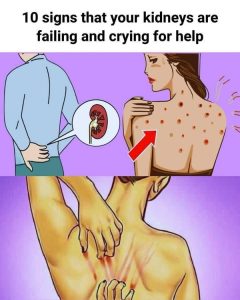Your kidneys are two of the hardest-working organs in your body, playing a vital role in filtering waste products, balancing bodily fluids, regulating blood pressure, producing hormones that control red blood cell production, and helping maintain strong and healthy bones. They are essential for keeping your entire system running smoothly. Despite their importance, kidney disease often develops silently and can go unnoticed until it has progressed to a serious stage. Understanding the early warning signs is crucial because recognizing symptoms early gives you the best chance to address problems before severe complications occur.

One of the earliest and often overlooked signs of kidney trouble is persistent fatigue and low energy levels. When your kidneys fail to function properly, waste products and toxins accumulate in your bloodstream. This buildup can leave you feeling constantly tired, weak, and unable to concentrate. Additionally, kidney disease frequently leads to anemia, a condition where the body has fewer red blood cells to carry oxygen, which only worsens feelings of exhaustion. You might find yourself struggling to get through daily tasks or feeling worn out after minimal activity, without realizing that your kidneys could be the root cause.
Another issue commonly tied to kidney disease is trouble sleeping. A buildup of toxins in the blood can make it difficult to fall asleep and stay asleep throughout the night. People living with kidney disease also have a higher risk of developing sleep apnea, a disorder where breathing repeatedly stops and starts during sleep. This not only disrupts your sleep cycle but also prevents your body from getting the deep, restorative rest it needs. Poor sleep can create a vicious cycle, leading to even more fatigue during the day and worsening your overall health.
Dry, itchy skin is another early indicator that your kidneys may not be working properly. Healthy kidneys play a key role in regulating the balance of minerals and nutrients in the blood. When kidney function declines, these balances are disrupted, leading to mineral and bone disorders that can manifest as persistent skin dryness and intense itching. This symptom might be easily attributed to other causes like weather changes or allergies, but if it persists, it could be an important clue pointing to an underlying kidney issue.
Frequent urination, especially during the night, can also signal kidney problems. If you notice that you are waking up several times a night to urinate or feel an urgent need to go more often than usual, it may be because the filters in your kidneys have been damaged. Damaged kidneys may produce more urine because they lose the ability to properly filter and reabsorb fluids. Although frequent urination can also be caused by urinary tract infections or prostate problems, it is important not to ignore this symptom.
Seeing blood in your urine is never normal and should be taken seriously. Healthy kidneys work to keep blood cells in the body while filtering out waste. When the kidneys are damaged, blood cells can start to leak into the urine. This can be a sign of kidney disease, infections, or even the presence of kidney stones. Even if it happens just once, you should make an appointment with a healthcare provider to get it checked out.
Similarly, noticing foam or excessive bubbles in your urine could be a cause for concern. Urine that looks unusually frothy, resembling the foam created when scrambling eggs, may indicate the presence of protein. Protein leakage in urine, known as proteinuria, is a strong sign that your kidneys’ filtering units are compromised and not functioning as they should. Healthy kidneys prevent significant amounts of protein from escaping into urine, so this symptom should never be ignored.
Swelling in the feet, ankles, or even hands often occurs when kidneys are not removing excess sodium efficiently. This fluid retention leads to noticeable swelling, which can be uncomfortable and may worsen over time. While swelling can have several causes, including heart or liver issues, it is also a classic symptom of kidney disease. If you notice persistent puffiness in your lower extremities, it is important to consult a medical professional to determine the underlying cause.
A poor appetite might seem like a minor issue, but it can actually be an early warning sign of kidney trouble. When waste builds up in the body, it can alter the way food tastes, cause nausea, and suppress your appetite altogether. Over time, this can lead to unintended weight loss and nutritional deficiencies, making it even harder for your body to function properly.
Muscle cramps, particularly those that are frequent or severe, can also be tied to kidney problems. Kidneys help balance electrolyte levels in the blood, including calcium and phosphorus. When these minerals are out of balance, it can lead to painful muscle cramps. While occasional cramping can happen for many reasons, ongoing muscle issues could suggest a deeper problem worth investigating.
Another subtle but telling sign is puffiness around the eyes. If you consistently wake up with swollen or puffy eyes, it could indicate that your kidneys are leaking a significant amount of protein into your urine rather than keeping it in your body where it belongs. This type of swelling, especially if paired with other symptoms, deserves medical attention.
If you experience any of these signs—especially if more than one symptom appears at the same time—it’s important to see a healthcare professional promptly. Early detection of kidney issues can make a huge difference, helping you prevent further damage and maintain a better quality of life. Simple blood and urine tests can provide vital information about your kidney function.
Protecting your kidneys involves maintaining a healthy, balanced diet, drinking enough water, exercising regularly, and carefully managing chronic conditions like diabetes and high blood pressure. Routine check-ups, especially if you have risk factors, can also help catch potential problems before they become severe. Your kidneys do so much for you; taking care of them is one of the best investments you can make in your long-term health.





